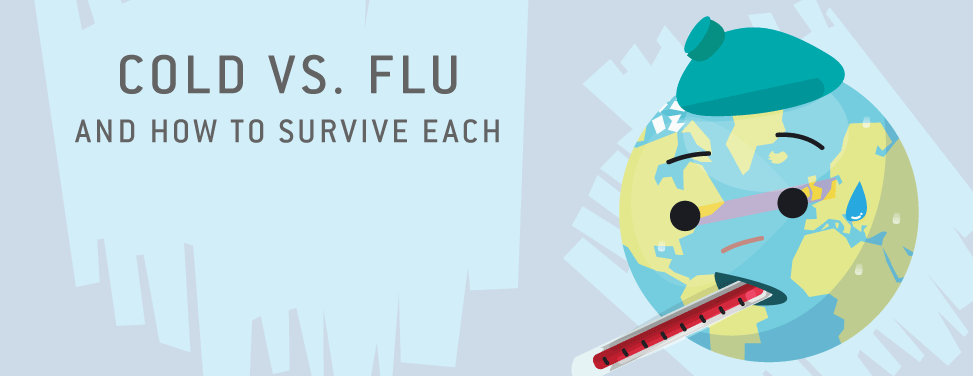
It's cold and flu season again.
With so many people affected by the common cold and the flu, it may seem impossible to avoid catching one, or both. But you can greatly reduce your chances. Arm yourself with the following information about the common cold and the flu and don't be the next victim.

Preventing and treating a cold
Colds are extremely contagious and are transmitted by droplets of fluid that contain the cold virus. These droplets become airborne when an infected person sneezes, coughs or speaks. You contaminate yourself by inhaling these droplets or touching a surface that the viruses have landed on and then touching your eyes or nose. To prevent getting a cold, take these simple precautions:
- Avoid close contact with people who have a cold
- Wash your hands often
- Do not touch your nose, eyes or mouth
Antibiotics will not cure a cold. In fact, nothing can cure a cold except time. However, self-care may help you reduce your discomfort. You may try over-the-counter (OTC) medications to relieve aches and fever or decrease congestion. You should also stay hydrated, avoid alcohol and smoke, get plenty of rest and possibly use a humidifier.
Preventing and treating the flu
A flu shot can lower your chance of getting the flu. Hand washing can also prevent the flu, or any flu-like illness. Even if someone in your home has the flu, you can reduce your risk of getting sick by washing your hands. If soap and water are not available, hand sanitizers are the second-best choice.
Most importantly, when you have the flu, you need rest. And until your symptoms are gone, it is a good idea to not go back to your full activity level. You also need plenty of fluids and should avoid contact with others for at least 24 hours after your fever is gone.
When to call the doctor
You should contact your doctor if you are at high risk for complications or if you experience any of the following difficulties:
- Your symptoms get worse
- Your symptoms last longer than two weeks
- After you feel better, you develop signs of a more serious problem like nausea, vomiting, high fever, shaking chills, chest pain or coughing with a thick mucus
- Shortness of breath
- Lightheadedness
- Bluish coloring of the skin or lips
- Chest pain or pressure when breathing

Flu Vaccine Myths That Can Make You Sick
It’s that time of the year again: flu shot time. If you’re like most people, getting a shot is about as exciting as getting a root canal. But before you skip getting vaccinated, read these common myths that can make you sick:
Fact: The timing of flu season is unpredictable.
While it tends to peak from December to February, the flu season actually runs from October through May, and it’s hard to say when the virus will start making its rounds. Not only that, but it takes about two weeks for the vaccine to kick in. If you wait, you could end up getting it too late in the season to help. (And what’s worse than getting a shot and then getting sick because you procrastinated?)
Fact: Flu shots are made with inactivated flu virus, which cannot give you the actual flu.
The most common reaction is soreness or redness at the site of the actual infection. A very small percentage of people will get a low-grade fever and aches as their body builds up an immune response, but this will only last one to two days and is not the same as getting the flu. Similarly, if you have ever gotten the nasal spray, which is a very weakened flu virus, you may have gotten a stuffy nose or cold-like symptoms as your body builds up an immune response.
Fact: The flu vaccine protects you and your baby.
The flu is, in fact, more likely to cause severe illness and complications if you’re expecting. It can also cause premature labor and other health issues for your baby. And here’s good news: the flu shot you get now will protect your baby after his or her birth. Just make sure to get the standard flu injection, not the nasal spray.
Fact: Thousands die from flu-related issues every year.
Certain groups of people are even more vulnerable and can develop deadly complications from the flu – specifically:
- Children under 2
- Adults over 65
- Women who are pregnant
- People with heart, kidney or liver disease, asthma, COPD, diabetes and all other chronic medical conditions
- People who are morbidly obese
